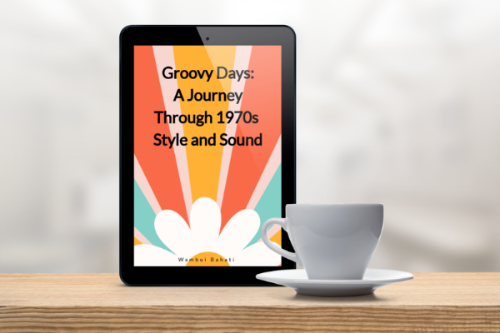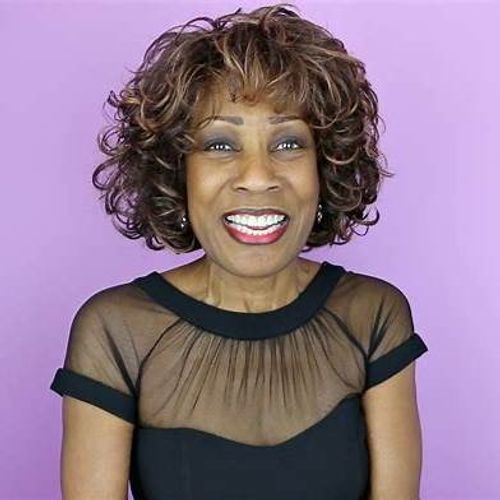Mom's Fierce Love: The Day I Drank from the Wrong Fountain
Wambui Bahati takes us on a powerful journey back to her childhood in Greensboro, North Carolina, during the turbulent times of Jim Crow laws in 1958. At just eight years old, she faced the harsh realities of racial segregation when she unknowingly drank from a "whites only" water fountain while shopping with her mom. The panic and confusion that ensued, coupled with her mother’s fierce reaction, highlight the everyday challenges that African American families navigated during this era. Wambui's story not only reveals the complexities of a segregated society but also showcases the incredible strength and resilience of parents who fought to protect their children from injustice. Join us as we reflect on this poignant memory, celebrating the power of parental love and the legacy of resilience that continues to inspire today.
Let’s take a stroll down memory lane to 1958 Greensboro, North Carolina, where Wambui Bahati shares a childhood story that packs a punch! At eight years old, Wambui unknowingly sips from a 'whites only' water fountain, a small act with huge consequences. Suddenly, the playful innocence of childhood collides with the harsh realities of racial segregation, and her mom’s explosive reaction sends shockwaves through their day. She yells, she drags Wambui out of the store, but it’s all part of a protective instinct in a world divided by color. What’s fascinating is how Wambui reflects on this incident years later, realizing that her mother’s fierce demeanor was not just anger, but a carefully crafted performance—a way to assert their dignity in a society that sought to strip it away. The discussion unfolds with humor and insight as we explore the ways that families navigated these treacherous waters, maintaining love and resilience in the face of systemic racism. Join us for a heartfelt journey that blends history, personal narrative, and the unbreakable bond between a mother and daughter, illustrating how love can triumph even in the darkest times.
Takeaways:
- Wambui Bahati's childhood encounter with a segregated water fountain reveals the harsh realities of Jim Crow laws.
- Her mother's fierce reaction showcased the protective instincts of parents facing racial injustice.
- The story highlights the emotional weight of navigating a segregated society during the 1950s.
- This powerful memory serves as a reminder of the resilience and strength of African American families.
- The water fountain incident illustrates the everyday challenges faced by black children growing up in a divided America.
- Wambui's experience emphasizes the importance of parental love and the lessons learned from painful moments.
Transcript
Now, these were laws that said that blacks and whites, back in those days, I remember being called Negroes.
Speaker A:So the Negroes and the white people were to be separate.
Speaker A:Everything was to be separate.
Speaker A:For instance, there were separate schools, there were separate restaurants, separate bathrooms, and even separate water fountains.
Speaker A:It wasn't until a lot of really dedicated brave, both, some of some black, some white, fought to get these laws reversed.
Speaker A: rsed officially until the mid-: Speaker A:And even then, there was spillover where it took some years after that for people to understand, okay, we're doing a new thing here now.
Speaker A:So I remember being about eight, maybe nine, but I'm thinking I was, like, somewhere around eight years old and being downtown with my mother in Greensboro one day.
Speaker A:So I would have been.
Speaker A: It would have been about: Speaker A:And so we were downtown and my mother was in a store.
Speaker A:And we understood that there were certain stores that we were not even welcome in, but then certain stores would let you in.
Speaker A:But we were like walking on eggshells whenever we were in these stores, because we just didn't feel comfortable in there.
Speaker A:And so on this particular day, my mother's in a store, and she's taking care of some business there.
Speaker A:And I see water fountains, and I see two of them, and one of them is kind of a tall, cooler type water fountain, and one looks like a white, you know, sink.
Speaker A:And so I drink from the taller, prettier looking water fountain.
Speaker A:And all of a sudden, there are people walking toward me.
Speaker A:I noticed that white people are walking toward me.
Speaker A:Some white people just stop.
Speaker A:It was.
Speaker A:And my mother gets a wind of what's going on.
Speaker A:And so my mother goes ballistic.
Speaker A:And my mother.
Speaker A:I've never seen my mother like that before.
Speaker A:And I've never seen her like that since.
Speaker A:I mean, even when we broke her favorite lamp because we were playing around in the living room, I thought that was the worst I would ever see of my mother.
Speaker A:But I saw a side of my mother on this day that I just could never have imagined.
Speaker A:And she was yelling and she was screaming at me, and she was saying, can't you read?
Speaker A:You can read.
Speaker A:Can't you read those words?
Speaker A:That water fountain's not for you.
Speaker A:Why did you drink from that water fountain?
Speaker A:Oh, wait till I get you home.
Speaker A:Oh, my God, I can't believe you did this.
Speaker A:And she went on and on, and she grabbed me and was dragging me out of the store, saying, wait till I get you home.
Speaker A:I thought you could read.
Speaker A:I thought you were better than that.
Speaker A:I thought.
Speaker A:And she just took me out the store.
Speaker A:And then she went around the corner.
Speaker A:When she got around the corner, my mother said, you want to get some donuts?
Speaker A:So donuts is what we did when we were selling.
Speaker A:Don't feeling sad or something.
Speaker A:That was my mother's way of cheering us up.
Speaker A:She would buy us a donut, so we got some donuts.
Speaker A:And my mother was very happy, cheerful, never mentioned that incident again.
Speaker A:And we went on about our day.
Speaker A:And what I realized was that my mother had to put on this show.
Speaker A:She needed for the white people to understand she had it because she.
Speaker A:It was her way of protecting me from them.
Speaker A:She wanted to say, you know what?
Speaker A:Y'all don't even have to say nothing.
Speaker A:I know this was wrong.
Speaker A:I'm gonna take care of this Negro child.
Speaker A:Y'all don't even have to say that was her message to the people who were in the store is, I got this.
Speaker A:Oh, yeah, I got this.
Speaker A:And so that was her way of saying, y'all don't have to say nothing.
Speaker A:Don't step to my child.
Speaker A:Don't step to me.
Speaker A:We got this.
Speaker A:I know what to do.
Speaker A:And so she drugged me out of that store.
Speaker A:And what I realize now is that my mother could have cared less about that water fountain.
Speaker A:And in my head, when I think back over those days and times, I'm pretty sure that my mother was not the only mother who at times had to do a performance that should receive an award beyond any acting award that ever existed.
Speaker A:And so that was her way, and I'm sure many other parents way of protecting their children is they had to go into this show to let you know, oh, you know what we got.
Speaker A:You don't have to say nothing.
Speaker A:I got this.
Speaker A:And so I love my mother for that.




